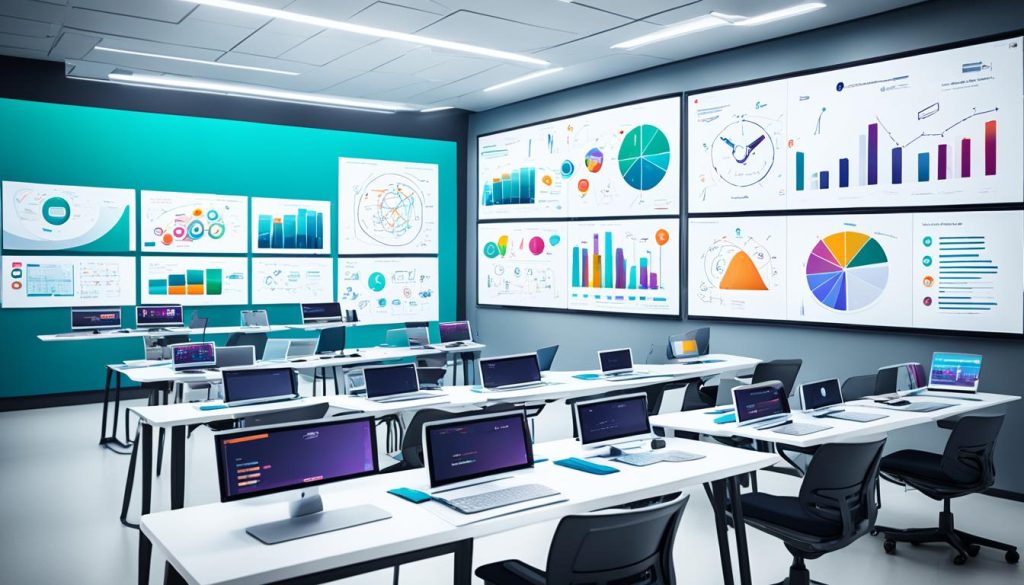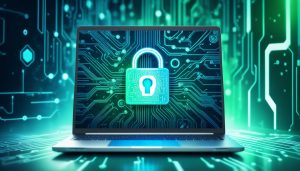Embrace Academic Excellence with the Flexibility of Distance Learning PhD Programs
In recent years, distance learning PhD programs and online doctoral education have become increasingly popular options for individuals looking to pursue a Ph.D. remotely. These programs provide the flexibility and accessibility that traditional on-campus programs may not offer. Whether you are a working professional, have family commitments, or face geographical limitations, distance learning allows you to explore remote doctoral programs and elevate your expertise from the comfort of your own home.
Key Takeaways:
- Distance learning PhD programs allow individuals to pursue a Ph.D. remotely, offering flexibility and accessibility.
- Online doctoral education breaks down geographical barriers, enabling individuals to explore remote doctoral programs.
- Distance learning programs provide an opportunity to elevate your expertise while balancing work, family, or other commitments.
- Embracing distance learning unleashes the future of academic excellence through online Ph.D. programs.
- Distance learning enhances inclusivity and adaptability in higher education.
The Changing Face of Education
The traditional model of education with physical classrooms and face-to-face interactions is no longer the sole option for higher studies. The evolving education landscape has witnessed the rise of innovative online learning platforms and virtual classrooms. Distance graduation courses have emerged as a flexible and accessible alternative, offering students the opportunity to learn at their own pace. These programs break down geographic barriers and provide a wide range of options for individuals seeking higher education.
In today’s fast-paced world, where flexibility is crucial, distance graduation courses have revolutionized the way education is delivered and accessed. With the help of evolving technology, students can now engage in interactive virtual classrooms, collaborate with peers worldwide, and access a wealth of resources anytime, anywhere.
With innovative online learning platforms, students can explore a variety of programs and courses tailored to their interests and career goals. These platforms offer flexible learning options that accommodate different schedules and lifestyles, allowing individuals to balance work, family, and education effectively.
One of the key advantages of distance graduation courses is the elimination of geographical limitations. Students no longer need to relocate or commute long distances to attend a specific university. Instead, they can enroll in reputable institutions and pursue their education remotely.
Distance graduation courses have provided a gateway to education for individuals living in remote areas or facing challenges in accessing traditional institutions. These programs have opened doors for countless students, allowing them to pursue their academic aspirations without compromising other aspects of their lives.
Embracing Technological Advancements in Education
The integration of innovative technology has significantly enhanced online learning experiences. Virtual classrooms equipped with interactive tools and multimedia content create an engaging environment that transcends traditional boundaries. Students can actively participate in discussions, collaborate on group projects, and receive personalized feedback from instructors, all within the virtual realm.
Moreover, distance graduation courses offer flexibility in terms of learning materials and resources. Students can access digitized textbooks, e-books, videos, and scholarly articles, empowering them to engage with the latest research and developments in their field of study.
As the education landscape continues to evolve, the possibilities for innovative learning experiences are endless. Institutions and educators are constantly exploring new technologies and approaches to enhance online education and provide students with the best possible learning opportunities.
The Benefits of Flexible Learning
Flexible learning options in distance graduation courses are a game-changer for many individuals. Whether seeking a career change, furthering their education, or simply pursuing personal interests, flexible learning ensures that education fits harmoniously into students’ lives.
By offering the freedom to study at their own pace, distance graduation courses cater to the diverse needs and responsibilities of students. This flexibility allows individuals to balance work, family commitments, and personal interests alongside their academic pursuits.
Flexible learning options have provided an opportunity for lifelong learning, empowering individuals to continuously acquire knowledge and develop their skills. The ability to choose when and where to study has transformed the educational landscape into a more inclusive and accessible environment.
Virtual Classrooms and Beyond
Virtual classrooms are at the core of distance graduation courses, facilitating interaction and collaboration between students and instructors. Through video conferencing, discussion forums, and other virtual tools, students can actively engage with course materials, seek clarification, and connect with fellow learners.
Virtual group projects enable students to work collectively on real-world scenarios, encouraging teamwork and problem-solving skills. These collaborative experiences foster valuable connections and networking opportunities, transcending physical limitations and expanding students’ professional networks.
While there are unique challenges associated with online learning, institutions are continually adapting to ensure an optimal learning experience. They provide support systems, guidance, and mentorship opportunities to make distance graduation courses both enriching and rewarding.
| Benefits of Distance Graduation Courses | Advantages of Innovative Online Learning Platforms |
|---|---|
|
|
Benefits of Distance Graduation Courses
Distance graduation courses offer several advantages that make them a compelling option for students. These programs provide flexibility in learning, accessibility to education, and cost-effective opportunities to pursue higher education.
Flexibility in Learning
One of the key benefits of distance graduation courses is the flexibility they offer. Students have the freedom to customize their learning schedules, allowing them to balance their education with work, family, or other commitments. This flexibility empowers individuals to take control of their learning journey and study at their own pace.
Accessibility to Education
Distance graduation courses break down geographical barriers, providing access to education for individuals living in remote areas or facing physical disabilities. These programs eliminate the need for commuting or relocating, making education accessible to anyone with an internet connection. Regardless of their location, students can access high-quality education and pursue their academic aspirations.
Cost-effective Education
Pursuing a distance graduation course is often more cost-effective compared to attending a traditional university. With online programs, students can save on commuting, accommodation, and other associated expenses. Many online programs also offer affordable tuition fees and allow students to continue working while studying, making higher education more financially viable.
| Advantages of Distance Graduation Courses | |
|---|---|
| Flexibility in learning | Customize learning schedules |
| Accessibility to education | No geographical barriers |
| Cost-effective education | Saves on commuting and accommodation expenses |
Distance graduation courses offer students the opportunity to experience the advantages of online programs, enabling flexibility, accessibility, and cost-effective education. These programs are revolutionizing the face of higher education, making it more inclusive and adaptable to the diverse needs of students worldwide.
Online Learning Tools and Resources
The success of distance graduation courses is largely attributed to the advanced online learning tools and resources available today. These tools create a dynamic and engaging learning environment, allowing students to access a wealth of multimedia content, virtual classrooms, and interactive assignments. Through the integration of these resources, online learning has become interactive and facilitates effective knowledge acquisition.
Virtual Classrooms
Virtual classrooms have revolutionized distance learning by providing students with a platform to attend live lectures, participate in discussions, and collaborate with peers in real-time. These virtual spaces replicate the traditional classroom setting, offering a sense of community and fostering interactive learning experiences.
Multimedia Content
Online learning platforms offer a vast array of multimedia resources that enhance the learning experience. Students can access e-books, journals, videos, and interactive presentations, allowing them to engage with the course material in various formats. The incorporation of multimedia content promotes visual and auditory learning, catering to different learning styles.
“Virtual classrooms and multimedia content have transformed online education, providing students with immersive and interactive learning experiences.”
Online Resources
Distance graduation courses provide students with a wide range of online resources such as digital libraries, research databases, and academic journals. These resources allow students to explore in-depth topics, access the latest research, and expand their knowledge beyond the course materials. The availability of online resources broadens students’ horizons and enables them to delve deeper into their areas of interest.
Interactive Assignments
Interactive assignments engage students in hands-on learning experiences, encouraging critical thinking and problem-solving skills. These assignments may include group projects, case studies, simulations, and quizzes. Through interactive assignments, students can apply theoretical concepts to real-world scenarios, enhancing their understanding and practical application of the course material.
Overall, the integration of virtual classrooms, multimedia content, online resources, and interactive assignments has transformed distance graduation courses into immersive educational experiences. These tools and resources empower students to actively participate in their learning journey and acquire knowledge in an interactive and engaging manner.
Overcoming Challenges in Distance Graduation Courses
While distance graduation courses offer numerous advantages, there are also challenges that need to be addressed. One challenge is the lack of physical interaction between students and instructors.
To overcome this, institutions offering online programs incorporate virtual group projects, discussion boards, and periodic live sessions to foster a sense of community among students. These initiatives bridge the gap created by physical distance and provide opportunities for collaboration and interaction.
By utilizing virtual tools, such as group project platforms and online discussion boards, students can engage with their peers and instructors, fostering a supportive learning environment. These virtual interactions help combat potential feelings of isolation and enhance the overall learning experience.
“Online education has opened up new avenues for students to connect and learn from one another. Virtual platforms allow us to build vibrant and interactive communities, even from a distance.” – Dr. Emily Johnson, Online Education Specialist
Through virtual tools and platforms, students can collaborate on projects, engage in group discussions, and participate in live sessions where they can ask questions and receive immediate feedback. These interactions foster a sense of community and encourage active learning, despite the physical separation.
Additionally, online programs often provide access to faculty and student support services through virtual channels. Students can connect with professors and peers via email, video conferencing, or discussion forums, ensuring that they receive the guidance they need throughout their academic journey.
By fostering community through virtual tools, distance graduation courses create an inclusive and supportive learning environment where students can engage with their peers and instructors, despite the lack of physical interaction.
The Future of Higher Education
As the landscape of education continues to evolve, distance graduation courses and online learning are set to play a pivotal role in shaping the future of higher education. The convenience, flexibility, and accessibility they offer are reshaping the way individuals approach learning, making education more inclusive and adaptable to the diverse needs of students worldwide.
Embracing the opportunities presented by online graduation programs opens doors to a world where education knows no bounds, empowering individuals to achieve their academic and professional goals on their own terms.
Advantages of Distance Graduation Courses:
- Flexibility in learning, allowing individuals to customize their schedules.
- Accessibility to education, breaking down geographical barriers.
- Cost-effective education, eliminating commuting and accommodation expenses.
- Inclusive learning, catering to the needs of diverse students.
- Adaptable to individual requirements, providing personalized learning experiences.
“The future of higher education lies in embracing distance graduation courses and the opportunities they bring. Online learning allows for greater inclusivity, flexibility, and adaptability, empowering individuals to shape their own educational journeys.”
Adapting to Changing Needs:
With the growth of distance graduation courses, educational institutions are continuously improving their online learning tools and resources to create a dynamic and engaging learning experience. Virtual classrooms, multimedia content, and interactive assignments provide a rich and interactive platform for students to acquire knowledge.
The Benefits of Inclusivity:
Distance graduation courses are making education more inclusive by removing barriers that previously limited access to higher education. Individuals who face geographical limitations, physical disabilities, or other challenges can now pursue their academic aspirations and contribute to society.
The Promise of Adaptable Learning:
As we move forward, adaptable learning will be a cornerstone of higher education. Distance graduation courses offer the flexibility for individuals to learn at their own pace, allowing them to balance work, family, and other commitments while pursuing their degree. This adaptability ensures that education can fit into the lives of individuals without disrupting their personal or professional responsibilities.
| Benefits of Distance Graduation Courses | Inclusive Education | Adaptable Learning |
|---|---|---|
| Flexibility in learning schedules | Breaking down geographical barriers | Personalized learning experiences |
| Accessibility to education | Catering to the needs of diverse students | Learning at one’s own pace |
| Cost-effective education | Empowering individuals to shape their educational journey | Fitting education into personal and professional commitments |
With distance graduation courses shaping the future of higher education, individuals can unlock limitless possibilities and achieve their academic and professional goals. Education is no longer confined by physical boundaries, as technology opens new gateways to learning and empowers individuals to thrive in a rapidly changing world.
How Do Distance Graduation Courses Work?
Distance graduation courses are academic programs that allow students to earn a degree remotely without attending traditional on-campus classes. These programs leverage online platforms, study materials, and virtual communication tools to deliver lectures, assignments, and exams.
Students have the flexibility to access course materials at their own pace, making distance graduation courses ideal for individuals with work or other commitments. Interaction with professors and peers often occurs through discussion forums, video conferences, and email, creating a sense of connection in the virtual learning environment.
Technological tools play a significant role in creating a seamless remote learning experience. From virtual classrooms and multimedia content to online resources and interactive assignments, these tools enhance the overall learning process and facilitate effective knowledge acquisition.
In summary, distance graduation courses provide the flexibility and convenience for students to pursue their academic goals remotely. Through technology and virtual communication, students can engage in a dynamic learning experience while maintaining their personal and professional commitments.

Impact of COVID-19 on Distance Learning
The ongoing COVID-19 pandemic has had a profound impact on the field of education, forcing traditional institutions to quickly adapt and implement remote learning options. As schools and universities worldwide faced closures and social distancing measures, the shift to online instruction became necessary to ensure the continuity of academic activities.
Distance graduation courses, already established as a flexible and accessible mode of learning, have played a crucial role during this crisis. These programs have provided students with remote learning options, enabling them to continue their education despite the challenges posed by the pandemic.
With the closure of physical classrooms, distance graduation courses have emerged as a viable alternative, offering the flexibility and accessibility needed for students to pursue education during a pandemic. Students can attend lectures, complete assignments, and interact with professors and peers remotely, ensuring minimal disruption to their studies.
The impact of COVID-19 has accelerated the adoption of online instruction, transforming the educational landscape. Institutions have had to quickly adapt, expanding their online learning infrastructure and utilizing technological tools to deliver quality education remotely. Students are now presented with a wide range of remote learning options, providing them with the opportunity to continue their academic pursuits from the safety of their homes.
Furthermore, the pandemic has highlighted the importance of shifting to online instruction not only during times of crisis but also as a long-term solution to enhance educational accessibility. Remote learning options have the potential to overcome geographical barriers, allowing students from different regions to access quality education without the need for physical relocation.
“The shift to online instruction during the COVID-19 pandemic has accelerated the evolution of distance learning, making it an integral part of the future of education.”
Quotes:
“The shift to online instruction during the COVID-19 pandemic has accelerated the evolution of distance learning, making it an integral part of the future of education.”
—Dr. Samantha Thompson, Educational Technology Researcher
Advantages of Remote Learning Options:
- Continuity of education during a pandemic
- Flexibility in learning schedules
- Accessibility to education for students in remote areas
- Opportunity to use advanced technological tools
- Empowerment to control the learning environment
Disadvantages of Remote Learning Options:
- Lack of in-person interaction with instructors and peers
- Potential for feelings of isolation and disconnection
- Dependence on stable internet connectivity and appropriate devices
- Potential for distractions in home environments
| Pros | Cons |
|---|---|
| Flexibility in learning schedules | Lack of in-person interaction with instructors and peers |
| Accessibility to education for students in remote areas | Potential for feelings of isolation and disconnection |
| Opportunity to use advanced technological tools | Dependence on stable internet connectivity and appropriate devices |
| Empowerment to control the learning environment | Potential for distractions in home environments |
The impact of the COVID-19 pandemic on education has highlighted the importance of remote learning options. As institutions continue to adapt and refine their online curriculum, the shift to online instruction and the utilization of distance graduation courses are expected to have a lasting influence on the future of education.
Factors to Consider in Choosing a Distance Graduation Program
When embarking on the journey of choosing a distance graduation program, it is crucial to take into account several key factors that can greatly impact your educational experience. These factors include accreditation, program quality, and faculty expertise.
Accreditation: Ensuring that the program you choose is accredited is of utmost importance. Accreditation acts as a stamp of approval from recognized accrediting bodies, indicating that the program meets established standards of excellence. An accredited program ensures that your degree will be recognized by employers and other educational institutions, giving your qualification the credibility it deserves.
Program Quality: Evaluating the quality of the program is essential in selecting the right distance graduation program for your needs. Reviews from current and past students, rankings, and feedback can provide valuable insights into the program’s strengths, weaknesses, and overall reputation. It is essential to consider factors such as curriculum design, learning resources, and the level of support provided to ensure a fulfilling and enriching educational experience.
Faculty Expertise: The expertise and qualifications of the faculty members are crucial in facilitating quality education and guidance throughout your program. Research the faculty profiles to gain an understanding of their academic backgrounds, industry experience, and research contributions. Faculty members with extensive expertise in their respective fields can offer valuable insights, mentorship, and support, enabling you to maximize your learning potential.
“By carefully considering the accreditation, program quality, and faculty expertise, you can make an informed decision when choosing a distance graduation program.”
Choosing the right distance graduation program is a significant decision that can shape your academic journey and future career prospects. By weighing the factors of accreditation, program quality, and faculty expertise, you can ensure that you select a program that aligns with your goals, offers a high-quality education, and provides the necessary support for your success.
Conclusion
Distance graduation programs offer a flexible and accessible pathway to academic excellence. These programs provide individuals with the opportunity to pursue a Ph.D. remotely, explore remote doctoral programs, and elevate their expertise with distance learning. The evolving landscape of education, along with technological advancements, has made it possible for individuals to unleash the future of academic excellence through online Ph.D. programs. Embracing this mode of education opens doors to new opportunities and empowers individuals to achieve their academic and professional goals.
With the convenience and flexibility offered by distance graduation programs, students can customize their learning schedules, making it easier to balance work, family, and other commitments. Students living in remote areas or facing physical limitations can access education that may have been otherwise challenging to attain. Additionally, distance graduation programs are often more cost-effective, eliminating expenses such as commuting and accommodation. The use of advanced online learning tools and resources further enhances the overall learning experience by creating dynamic and engaging virtual classrooms.
Although distance graduation programs may present challenges in terms of physical interaction and potential feelings of isolation, institutions have implemented various virtual strategies to foster a sense of community among students. Through virtual group projects, discussion boards, and live sessions, students can collaborate, interact, and establish connections with their peers worldwide. By embracing the opportunities presented by online Ph.D. programs, individuals can unleash their full potential and pave the way for a future of academic excellence and professional growth.
FAQ
What are distance graduation courses?
How do distance graduation courses work?
What are the benefits of distance graduation courses?
What online learning tools and resources are available in distance graduation courses?
How are challenges in distance graduation courses addressed?
How has the COVID-19 pandemic impacted distance learning?
What factors should I consider when choosing a distance graduation program?
Source Links
- https://news.fordham.edu/university-news/preparing-for-uncertainty-fordham-embraces-flexible-education-model/
- https://medium.com/@graduationinoneyear4/embracing-the-future-the-rise-of-distance-graduation-courses-and-online-learning-014eef06ad0d
- https://www.federalregister.gov/documents/2020/09/02/2020-18636/distance-education-and-innovation




